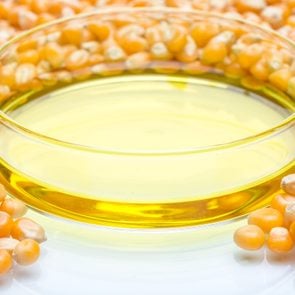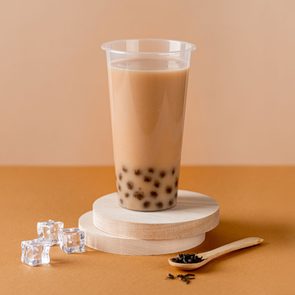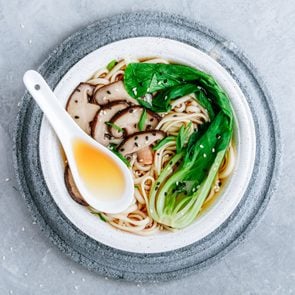Is Pumpkin a Fruit or a Vegetable?
Updated: Jan. 19, 2023

It's just as tasty in sweet treats as it is in savory dishes, so is pumpkin a fruit or a vegetable? We have the answer.
When we’re not carving it up to scare trick-or-treaters, pumpkin poses something of a puzzle. We can use it in both savory and sweet recipes, adding chunks to chili and whipping it into pumpkin pie. It’s become the go-to fall flavor for lattes and baked goods but also stars in plenty of unique pumpkin recipes. (Pumpkin soup, anyone?) All this makes it hard to classify. Is pumpkin a fruit? Is pumpkin a vegetable?
Indeed, this isn’t the only food that confuses us in this way. We’re constantly asking (or being asked) if avocado is a fruit or vegetable, cucumber is a fruit or vegetable, eggplant is a fruit or vegetable, corn is a fruit or vegetable and tomato is a fruit or vegetable.
Today, our food facts focus on pumpkins. Here, we’re getting to the bottom of this chilly-season conundrum. Is a pumpkin a fruit, or is it a vegetable? You’re about to find out.
Get Reader’s Digest’s Read Up newsletter for more food news, humor, cleaning, travel, tech and fun facts all week long.
What is the difference between a fruit and a vegetable?
Don’t worry, we’ll answer “Is pumpkin a fruit?” But before we dive in, let’s break down the difference between these two types of produce, according to their dictionary definitions. Here’s how Merriam-Webster defines the two:
- Fruit: “The usually edible reproductive body of a seed plant”
- Vegetable: “A usually herbaceous plant (such as the cabbage, bean or potato) grown for an edible part that is usually eaten as part of a meal”
In other words, fruit is something edible that a plant produces, while a vegetable is a plant that’s edible. For example, an apple tree bears apples that you pick and eat—you eat the apple, not the entire tree. But you can grow a carrot, harvest it, then eat the entire thing. You don’t leave part of it in the ground to grow more carrots.
It all comes down to how the food grows and which parts we eat.
Is pumpkin a fruit or vegetable?
Based on these official definitions, we now know that pumpkin is a fruit! If you’ve ever been to a pumpkin patch, you may recall seeing green vines sprawling across the field, dotted with bright orange pumpkins. That visual tells you all you need to know.
Because pumpkins grow on a vine, we pick them from the vine and we don’t eat the vine, they’re classified as fruit—even if they are destined to haunt your stoop as a jack-o’-lantern or are part of a veggie-based stew.
What fruit type is a pumpkin?
Pumpkins are in the gourd family of flowering plants called Cucurbitaceae, which includes about 975 species of food and ornamental plants. Most of the species in this family are quite similar to pumpkins, growing on long vines and producing fleshy fruits with lots of seeds and a tough rind.
There are a few different species within the family that produce what we know as pumpkins, including Cucurbita pepo (aka the common field pumpkin), Cucurbita moschata (the type commonly used to make canned pumpkin) and Cucurbita maxima (giant pumpkins and large winter squashes like kabocha and Hubbard).
Typically, pumpkins are characterized by their hard, bright orange rind and the grooves that run from the stem to the base. But not all pumpkins look exactly like this. Take, for instance, the tan, oblong variety Libby’s grows, which has prompted customers to wonder whether the company’s canned pumpkin is really squash. (It is!)
Is pumpkin a squash?
We know that pumpkins come from the family Cucurbitaceae. Take a step down and you’ll find that they belong to the genus Cucurbita, which is the technical term for squash. So yes, pumpkins are squashes.
One telltale characteristic of winter squashes like pumpkin, butternut squash, acorn squash and spaghetti squash—which are all fruits, according to the definition above—is that they grow on vines, are usually on the large side, have relatively hard rinds (a key difference from summer squash) and can be stored for many months if they are kept dry and well above freezing.
Are you ready for another great food quiz question, perhaps even better than “Are peanuts nuts?” Give this one a guess: Are pumpkins berries?
Drum roll, please! Not only is pumpkin a fruit, but pumpkin and all squashes are actually berries, botanically speaking. In botany, a berry is any fleshy fruit that has a lot of seeds and is derived from a single ovary of a single flower. This is the case with pumpkins, which are a type of berry known as a pepo.
Interestingly, this is not the case for strawberries, blackberries or raspberries. Regardless of their names, they’re not berries in the botanical sense.
Are pumpkins healthy?
One thing is true regardless of the answer to “Is a pumpkin a fruit or vegetable?” Pumpkin comes with some impressive health benefits. The most distinctive characteristic of pumpkin, its bright orange hue, means that it is loaded with vitamins A and C, which play key roles in maintaining strong eyesight and a robust immune system, respectively.
Pumpkin is also a great source of both soluble and insoluble fiber, which will keep your digestive system healthy and help keep you full for longer. Finally, pumpkin is one of the best sources of alpha-carotene, an antioxidant that keeps cells functioning at their peak and may even inhibit the growth of cancer cells.
By now, you know the answer to “Is pumpkin a fruit?” Next, discover whether cereal is soup and if a hot dog is a sandwich.
Sources:
- Merriam-Webster: “Vegetable”
- Merriam-Webster: “Fruit”
- Encyclopaedia Britannica: “Pumpkin”
- Encyclopaedia Britannica: “Cucurbitaceae”
- Encyclopaedia Britannica: “Squash”
- Encyclopaedia Britannica: “Berry”
- JAMA Internal Medicine: “Serum α-Carotene Concentrations and Risk of Death Among U.S. Adults”





















